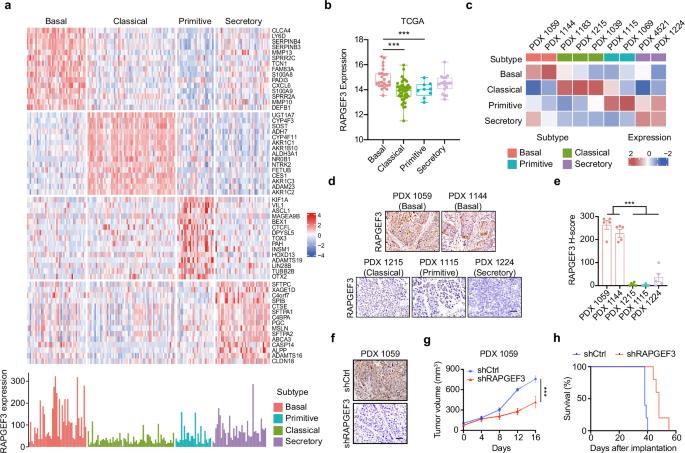Identification of RAPGEF3 as the therapeutic vulnerability of basal-subtype lung squamous cell carcinoma
IF 7.3
1区 医学
Q1 BIOCHEMISTRY & MOLECULAR BIOLOGY
引用次数: 0
Abstract
Lung squamous cell carcinoma (LUSC), particularly the basal-subtype, remains a leading cause of cancer-related mortality, with limited therapeutic options and poor survival rates. In this study, we identify RAPGEF3 as a critical driver of malignant progression in basal-subtype LUSC. Our findings show that RAPGEF3 is significantly upregulated in basal-subtype LUSC and plays a pivotal role in tumor progression by activating the RAP1A-AKT signaling axis, essential for cell proliferation and survival. We demonstrate that inhibiting RAPGEF3 with the selective inhibitor ESI-09 significantly suppresses tumor growth in patient-derived xenograft (PDX) models without notable toxicity. Furthermore, our results reveal that RAP1A, rather than its paralog RAP1B, mediates tumor survival and proliferation through AKT signaling, providing new insights into the functional differences between these isoforms. Given the lack of targeted therapies for basal-subtype LUSC, RAPGEF3 emerges as a novel and promising therapeutic target. These findings not only contribute to understanding the molecular mechanisms of basal-subtype LUSC but also suggest that RAPGEF3-targeted therapies may be applicable to other cancers with similar oncogenic signaling pathways.

RAPGEF3作为基底亚型肺鳞状细胞癌治疗易感性的鉴定
肺鳞状细胞癌(LUSC),特别是基底亚型,仍然是癌症相关死亡的主要原因,治疗选择有限,生存率低。在这项研究中,我们发现RAPGEF3是基底亚型LUSC恶性进展的关键驱动因素。我们的研究结果表明,RAPGEF3在基底亚型LUSC中显著上调,并通过激活RAP1A-AKT信号轴在肿瘤进展中起关键作用,而RAP1A-AKT信号轴对细胞增殖和存活至关重要。我们证明,用选择性抑制剂ESI-09抑制RAPGEF3可显著抑制患者源性异种移植(PDX)模型的肿瘤生长,且无明显毒性。此外,我们的研究结果表明,RAP1A,而不是其平行RAP1B,通过AKT信号介导肿瘤存活和增殖,为这些亚型之间的功能差异提供了新的见解。鉴于缺乏针对基底亚型LUSC的靶向治疗,RAPGEF3成为一种新的有希望的治疗靶点。这些发现不仅有助于理解基底亚型LUSC的分子机制,也提示rapgef3靶向治疗可能适用于具有类似致癌信号通路的其他癌症。
本文章由计算机程序翻译,如有差异,请以英文原文为准。
求助全文
约1分钟内获得全文
求助全文
来源期刊

Oncogene
医学-生化与分子生物学
CiteScore
15.30
自引率
1.20%
发文量
404
审稿时长
1 months
期刊介绍:
Oncogene is dedicated to advancing our understanding of cancer processes through the publication of exceptional research. The journal seeks to disseminate work that challenges conventional theories and contributes to establishing new paradigms in the etio-pathogenesis, diagnosis, treatment, or prevention of cancers. Emphasis is placed on research shedding light on processes driving metastatic spread and providing crucial insights into cancer biology beyond existing knowledge.
Areas covered include the cellular and molecular biology of cancer, resistance to cancer therapies, and the development of improved approaches to enhance survival. Oncogene spans the spectrum of cancer biology, from fundamental and theoretical work to translational, applied, and clinical research, including early and late Phase clinical trials, particularly those with biologic and translational endpoints.
 求助内容:
求助内容: 应助结果提醒方式:
应助结果提醒方式:


